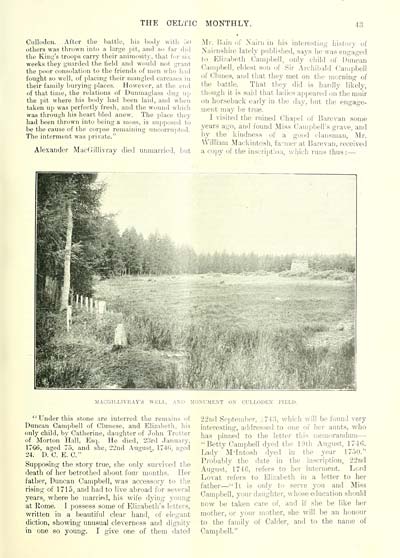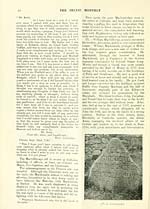Blair Collection > Celtic monthly > Volume 5, 1897
(69)
Download files
Complete book:
Individual page:
Thumbnail gallery: Grid view | List view

THE OELTIC MONTHLY.
43
Culloden. After the battle, Iiis body with .lO
others was thrown into a h^rge pit, and so fai- ibd
the Kind's troops carry their animosity, that for six
weeks they guarded tlie Geld and would not grant
the poor consolation to the friends of men who hud
fought so well, of placing their mangled carcases in
their family burying jilaces. However, at the end
of that time, the relations of Dunmaglass dug up
the pit where his body had been laid, and when
taken up was perfectly fresh, and the wound which
was through his heart bled anew. The place they
had been thrown into being a moss, is supptised t(j
be the cause of the corpse remaining uncorrupted.
The interment was private."
Alexander Mactiiilivray died unmairii'd, Imt
Mr. I Klin of Nairn in his iutere.stiiij^- his(iii\ dl'
Xaiiiishiio lately ]iubli^lied, ■say.'i he wa.s i'ii^hl^viI
to Eli/.aheth Campbell, only cliild of Dinicun
Oanipbell, eldest sou of Sir Ai'chibald Campbell
of Chines, and that they met on the morning of
the battle. That tliey did is hardly likely,
though it is said that ladii's appeared on the muir
on horseback early in the day, but tlie engage-
ment may be true.
I visited the ruined Chapel of Barevan some
years ago, ami found Miss ('anipbell's grave, and
by the kiudjiesa of a good clansman, Mr.
William Mackintosh, fa-iuei-at Barevan, received
a copy of the inscri|itio!i, which runs thus: —
M.iCGII.LIVUAY'S WELL, ANH MOXU.MENT ON CULLODEN FIELD.
" Under this stone are interred the remains of
Duncan Campbell of Chinese, and Elizabeth, his
only child, by Catherine, daughter of John Trotter
of Morton Hall, Esq. He died, 23rd January,
17G6, aged 75, and she, 2lJnd August, 1740, aged
24. D. C. E. C."
Supposing the story true, she only survived the
death of her betrothed about four months. Her
father, Duncan Campbell, was accessory to the
rising of 1715, and bad to live abroad for several
years, where he married, his wife dying yotmg
at Rome. I pos.sess some of Elizabeth's letters,
written in a beautiful clear hand, of elegant
diction, showing unusual cleverness and dignity
in one so young. I give one of them dated
22nd September, ,1743, whicli will be found very
interesting, addressed to one of her aunts, who
has pinned to the letter this memorandum —
"Betty Campbell dyed the lIHh August, 1746.
Lady M'Intosh dyed in the year 17.50."
Probably the date in the inscription, 22nd
August, 1746, refers to her interment. Lord
Lovat refers to Elizabeth in a letter to her
father — " It is only to serve you and Miss
Campbell, your daughter, whose education should
now be taken care of, and if she be like her
mother, or your mother, she will be an honour
to the family of Calder, and to the name of
Campbell."
43
Culloden. After the battle, Iiis body with .lO
others was thrown into a h^rge pit, and so fai- ibd
the Kind's troops carry their animosity, that for six
weeks they guarded tlie Geld and would not grant
the poor consolation to the friends of men who hud
fought so well, of placing their mangled carcases in
their family burying jilaces. However, at the end
of that time, the relations of Dunmaglass dug up
the pit where his body had been laid, and when
taken up was perfectly fresh, and the wound which
was through his heart bled anew. The place they
had been thrown into being a moss, is supptised t(j
be the cause of the corpse remaining uncorrupted.
The interment was private."
Alexander Mactiiilivray died unmairii'd, Imt
Mr. I Klin of Nairn in his iutere.stiiij^- his(iii\ dl'
Xaiiiishiio lately ]iubli^lied, ■say.'i he wa.s i'ii^hl^viI
to Eli/.aheth Campbell, only cliild of Dinicun
Oanipbell, eldest sou of Sir Ai'chibald Campbell
of Chines, and that they met on the morning of
the battle. That tliey did is hardly likely,
though it is said that ladii's appeared on the muir
on horseback early in the day, but tlie engage-
ment may be true.
I visited the ruined Chapel of Barevan some
years ago, ami found Miss ('anipbell's grave, and
by the kiudjiesa of a good clansman, Mr.
William Mackintosh, fa-iuei-at Barevan, received
a copy of the inscri|itio!i, which runs thus: —
M.iCGII.LIVUAY'S WELL, ANH MOXU.MENT ON CULLODEN FIELD.
" Under this stone are interred the remains of
Duncan Campbell of Chinese, and Elizabeth, his
only child, by Catherine, daughter of John Trotter
of Morton Hall, Esq. He died, 23rd January,
17G6, aged 75, and she, 2lJnd August, 1740, aged
24. D. C. E. C."
Supposing the story true, she only survived the
death of her betrothed about four months. Her
father, Duncan Campbell, was accessory to the
rising of 1715, and bad to live abroad for several
years, where he married, his wife dying yotmg
at Rome. I pos.sess some of Elizabeth's letters,
written in a beautiful clear hand, of elegant
diction, showing unusual cleverness and dignity
in one so young. I give one of them dated
22nd September, ,1743, whicli will be found very
interesting, addressed to one of her aunts, who
has pinned to the letter this memorandum —
"Betty Campbell dyed the lIHh August, 1746.
Lady M'Intosh dyed in the year 17.50."
Probably the date in the inscription, 22nd
August, 1746, refers to her interment. Lord
Lovat refers to Elizabeth in a letter to her
father — " It is only to serve you and Miss
Campbell, your daughter, whose education should
now be taken care of, and if she be like her
mother, or your mother, she will be an honour
to the family of Calder, and to the name of
Campbell."
Set display mode to: Large image | Transcription
Images and transcriptions on this page, including medium image downloads, may be used under the Creative Commons Attribution 4.0 International Licence unless otherwise stated. ![]()
| Early Gaelic Book Collections > Blair Collection > Celtic monthly > Volume 5, 1897 > (69) |
|---|
| Permanent URL | https://digital.nls.uk/75851753 |
|---|
| Shelfmark | Blair.57 |
|---|---|
| Additional NLS resources: | |
| Attribution and copyright: |
|
| Description | A selection of books from a collection of more than 500 titles, mostly on religious and literary topics. Also includes some material dealing with other Celtic languages and societies. Collection created towards the end of the 19th century by Lady Evelyn Stewart Murray. |
|---|
| Description | Selected items from five 'Special and Named Printed Collections'. Includes books in Gaelic and other Celtic languages, works about the Gaels, their languages, literature, culture and history. |
|---|

